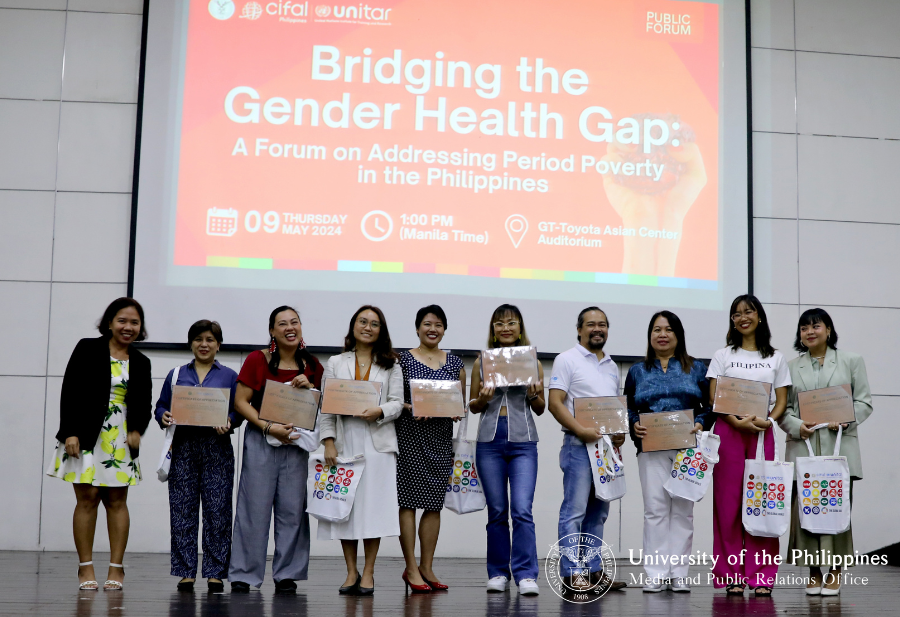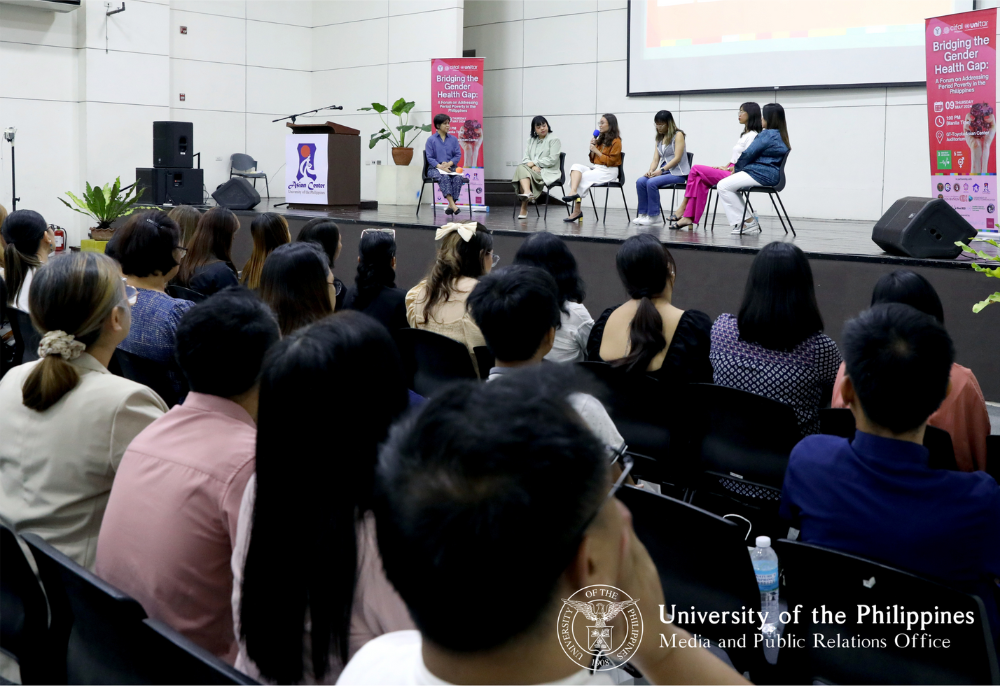
UP-CIFAL Philippines conducted a forum to initiate discourse about the prevalence of period poverty in the country on 9 May 2024 at the GT Toyota Asian Center Auditorium. Alongside the forum, booths featuring brands that promote sustainable menstrual products, such as COJO, Hiraya Pilipina, Nala Woman, and Sinaya Cup, were also set up.
The forum was held in celebration of Menstrual Hygiene Day on 28 May and Period Poverty Awareness Week from 25 May to 31 May, and it aimed to tackle the issue of gender inequity in the Philippines, particularly through the lens of menstruators experiencing period poverty. It also intended to discuss the integration of menstrual health management in the education curriculum and the mainstreaming of MHM in policies and frameworks.
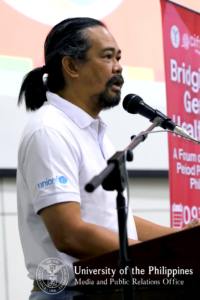
Jon Michael Villasenor, Water, Sanitation, and Hygiene (WASH) Specialist from UNICEF Philippines, formally commenced the forum by stressing that menstrual health and hygiene are still considered an invisible problem in the Philippines as menstruation is taboo and not openly discussed in Filipino society. Villasenor further shared the barriers the Filipino society faces in efficiently promoting menstrual health management, underlining the importance of reliable and regularly updated data to serve as the basis for future policies and initiatives.
He has also introduced Oky Philippines, a period-tracking app specifically devised to cater to the experience of Filipino menstruators. The application is co-developed by the Department of Health, Department of Education, Commission on Population and Development, National Youth Commission, and BARMM counterpart agencies, supported by the Australian government and UNICEF, and in partnership with Plan International.
The forum was divided into two parts: the talks which were subdivided into three: 1) contextualizing period poverty in the Philippines; 2) promoting menstrual health management among young adults; and 3) mainstreaming menstrual health management through policies and frameworks; and a panel discussion and question and answer portion with the speakers.
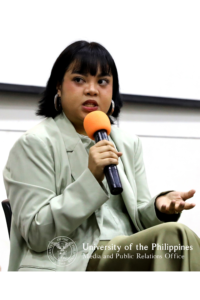
Gianinna Czareena Chavez, founder menstruator of We Bleed Red Movement Philippines, provided an overview of the widespread presence of period poverty in the Philippines. She also shared that her organization started as a passion project because of the shame one feels regarding their menstruation.
She further shared the reality of some menstruators in the Philippines who resort to using rags, leaves, tissue papers, and paper, or sometimes opt to just let the blood flow in place of clean and proper menstrual products.
Chavez also called out the inaccurate portrayal of menstruation in mainstream media. She says, “Menstruation is not born from violence, yet it is the most censored type of blood.”
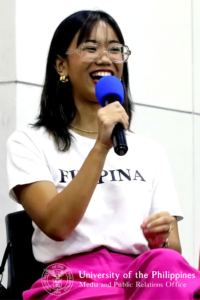
Cleo Loque, the chief executive officer and founder of Hiraya Pilipina, delved into period poverty as an overlooked health issue. One of the manifestations of period poverty is the shame that’s associated with menstruation, and the stigma surrounding this prevents individuals from talking about it. Loque expressed hopes that menstruation can be openly talked about while maintaining respect for our culture and religion.
Loque also addressed the stigma commonly associated with menstruation, combating them with science-based facts. She also highlighted the importance of using inclusive language in discussing period poverty to recognize all menstruators as Loque stated “not all women menstruate, and not all menstruating people are women.”
Lastly, Loque, as a founder of a period care brand, shared her journey in creating a sustainably sourced menstrual product. For Loque, a menstrual product is sustainable if the human body does not incur negative effects for long-term use and if it does not harm the environment. However, sustainability unfortunately does not equate to affordability and accessibility.
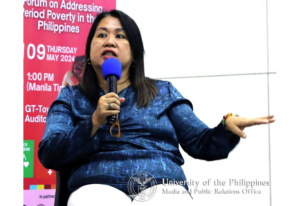
On the other hand, Dr. Maria Corazon Dumlao presented how the Department of Education streamlines menstrual health management (MHM) in the current curriculum. The integration of MHM in the Philippine education system enables learners to be better equipped with the knowledge to handle their menstruation with dignity and care, thereby producing positive impacts, such as improved attendance, better concentration, and academic performance among menstruating students.
As an effort to effectively promote MHM in schools, DepEd initiated the WASH in Schools Program, a collaboration with the German Cooperation, GIZ, Save the Children, and UNICEF. The program utilizes the Three-Star Approach, which is used to determine if national standards are achieved through a stepwise approach.
MHM is a critical aspect of health and hygiene among women and young girls in the Philippines, and certain factors, such as economic differences, cultural norms, and limited access to resources pose risks to one’s menstrual health. The cultural taboo about menstruation often causes misinformation, and popularizing MHM serves as a solution to combat this. DepEd employs various strategies to popularize MHM, such as curriculum integration, awareness campaigns, access to facilities and resources, and promotion of gender sensitivity and inclusivity in schools.
While improvements have been seen in the past few years, there is a need to ensure that vital information on MHM reaches its target audience. Dumlao enjoined everyone to join the call for continued efforts to popularize MHM across the country to foster a more inclusive and supportive learning environment for menstruators.

Furthermore, Athena Charanne Presto, senior lecturer from the UP Diliman Department of Sociology, discussed laws and policies to address period poverty in the Philippines. Presto emphasized that the Philippines has no policy or law directly addressing period poverty, only related policies such as Reproductive Health Law, interventions from DepEd, LGU initiatives, and laws combating discrimination against women.
“The reason why ang hirap gumawa ng policy directly addressing period poverty ay dahil [ito ay] resource-intensive at costly, especially in a developing country like the Philippines. Ang hirap i-justify na kailangan mo magbigay ng pera para magbigay ng napkin sa mga kababaihan [at] dahil tingin ng mga tao ay babae lang naman ang may kailangan niyan,” she stated.
Cultural diversity also serves as one of the reasons behind the difficulty in institutionalizing laws addressing period poverty. Presto accentuated that despite an array of menstrual products being provided to specific communities, such as menstrual cups and discs, menstruators would never use them as they would not be culturally appropriate.
She also discussed the entire policy cycle in line with forwarding period poverty, stressing that the end goal should be menstrual justice. While it’s vital to provide accessible menstrual products, it doesn’t eclipse the need to provide sustainable interventions to empower menstruators who are fighting for their rights.
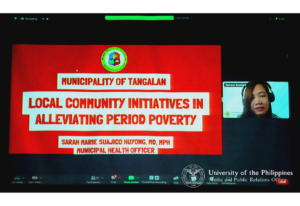
Dr. Sarah Marie Suajico-Huyong, the municipal health officer of Tangalan, Aklan on the other hand shared the initiatives of their community in alleviating period poverty. She shared that the Municipality of Tangalan is incorporating menstrual lectures for adolescents to increase awareness about the problems menstruators face.
Suajico-Huyong further underscored that the majority of the females in the Tangalan Municipality LGU are of reproductive age. Hence, they also implemented Ordinance No. 2022-214, an ordinance allowing menstruators to have two days to work from home during their period.
She hopes that small initiatives like that of the Tangalan LGU would help make a difference in reducing stigma about menstruation.
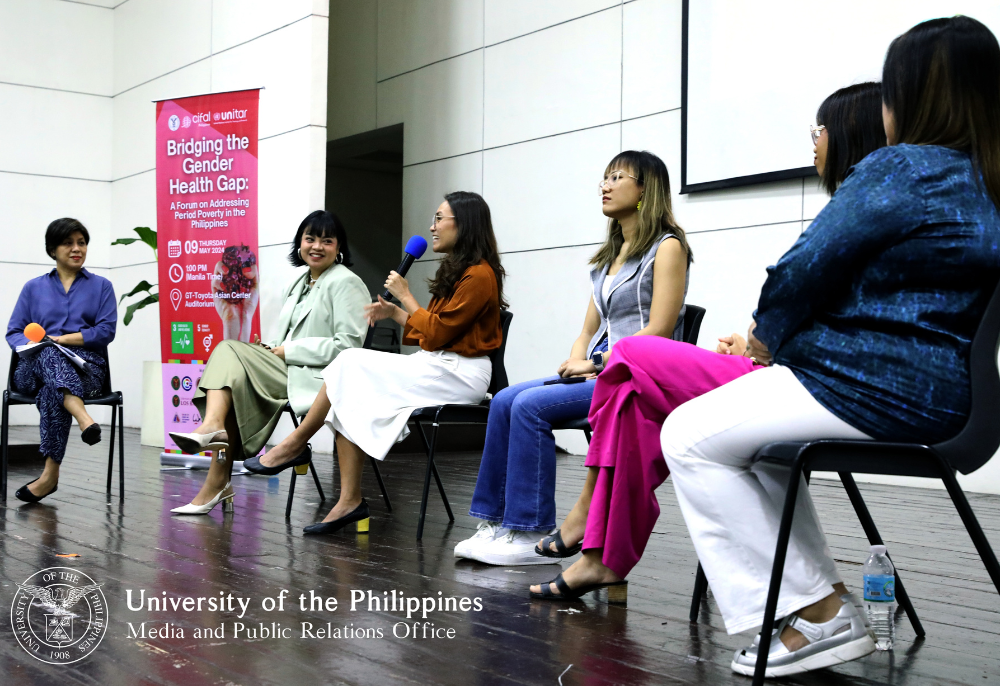
The panel discussion was then led by the forum’s host-moderator, Dr. Maria Dulce Natividad, associate professor from the UP Asian Center. She then asked the speakers how to elevate the conversation outside the classroom and in the media to ensure that there is awareness around menstruation.
Dumlao stressed that DepEd is building a mechanism to reach even the grassroots level. DepEd developed comprehensive policies to promote WASH such as access to sanitary pads, having toilet locks, ensuring safe toilet spaces, and adequate bins in schools. She added the recently launched Oky Period Tracker, in partnership with UNICEF, that helps in collating period data among students.
Loque, as a content creator herself, emphasized the importance of social media in disseminating information about the period.
“Social media is not a reflection of reality, but we cannot deny how big of an impact social media can play….And even pag nagla-live selling kami, binabanggit nila ‘yan out loud, terms that must be normalized [like] vulva, vagina, period, menstruation because by normalizing these words out loud in social media, I feel like it will have a huge impact on our day to day conversations,” she said.
Dr. Natividad also asked the speakers on the issue of the recently filed menstrual leave in Congress as it was met with criticisms mainly from employers whose concerns are in their businesses.
Chavez understands the predicament of employers citing possible economic losses should this become mandatory. As a temporary setup, she suggested that a few selected employees be given menstrual leaves while studies have yet to be produced. She also proposed to have qualifiers for businesses that can offer menstrual leaves.
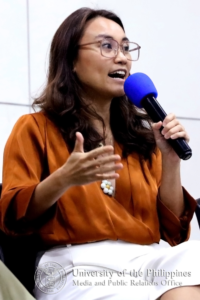
Nala Woman CEO Aiai Garcia, meanwhile, showcased her startup company’s initiatives in providing menstrual leaves. She said that some employers wanted to provide beyond what health maintenance organizations (HMOs) currently offer, however they have yet to know what efforts should be prioritized.
Presto historicized the enactment of giving menstrual leaves wherein it was the convenience of the employers to give leaves due to the reproduction capacity of women. She said that menstrual leave is only a short-term solution to the problems faced by menstruators. Instead, she advocated for inclusive healthcare and universal intervention of employers and government.
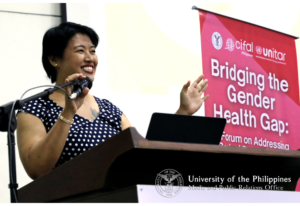
Dr. Marie Aubrey Villaceran, Director of the UP Center for Women’s and Gender Studies, synthesized the talks and the points raised during the panel discussion, highlighting that we need period visibility as stigma is still prevalent nowadays. Additionally, she also pointed out that poverty affects menstruating individuals disproportionately restricting their access to menstrual products, which affects their participation and advancement in schools and work.
Meanwhile, she acknowledged that there have been policies and guidelines that seek to address MHM in schools under the flagship school health programs, but the actual implementation of this policy is often lacking. A reason she cited is the lack of support from both government and private stakeholders.
She concluded her synthesis by underscoring the importance of the involvement of local communities in the planning and implementation of these efforts to ensure that the interventions are culturally appropriate and address the specific needs of different groups, especially those who are most vulnerable.
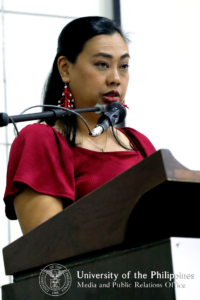
Dr. Estesa Xaris Que-Legaspi of the Lasallian Center for Inclusion, Diversity, and Well-being (LCIDWell) has also lauded the UP-CIFAL Philippines as well as the partners and sponsors for organizing a very timely event.
“A lot of people have so much difficulty in managing this very normal and human experience of menstruating. Studies from different sectors show varying figures but are in agreement that a significant number of individuals, many of whom are women, have varying degrees of difficulties related to menstruation from lack of access to menstrual products, hygiene facilities, and reproductive education,” she underscored.
She reminded the importance of bringing the period poverty issue into light, like that of CIFAL’s program, which will be a key to having a more inclusive society.
The event was formally concluded through the closing remarks given by UP-CIFAL Philippines Director, Michelle Palumbarit.
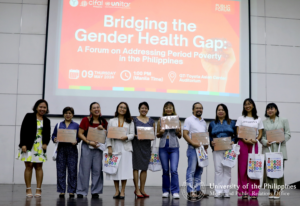
Partner organizations include the Lasallian Center for Inclusion, Diversity, and Well-being, Quezon City Gender and Development Council, Rappler Move PH, UN Development Programme Philippines, UP Asian Center, UP Center for Women’s and Gender Studies, UPLB College of Development Communication Department of Science Communication, UPLB Gender Center, UPLB College of Human Ecology Department of Human and Family Development Studies, UPLB Office of Anti-Sexual Harassment, UP Manila Center for Gender and Women Studies, and We Bleed Red Movement Philippines.
The forum ignited a very important conversation about the manifestations of period poverty in the Philippines and the lack of policies and services to address them. As Villasenor pointed out, the forum signifies that we have come far in recognizing the existence of period poverty in the country, but much still needs to be done. Through promoting menstrual health management and advocating for period visibility, we can create a safer space for menstruators.
Watch the forum here.
—
For more information about the event and its outcomes, please contact:
Andreana Gabrielle David (Ms.)
Communications Officer
UP-CIFAL Philippines
Email: [email protected]
[email protected]

![[RIGHT]unitar_logo](https://cifal.up.edu.ph/wp-content/uploads/2024/01/RIGHTunitar_logo.png)
